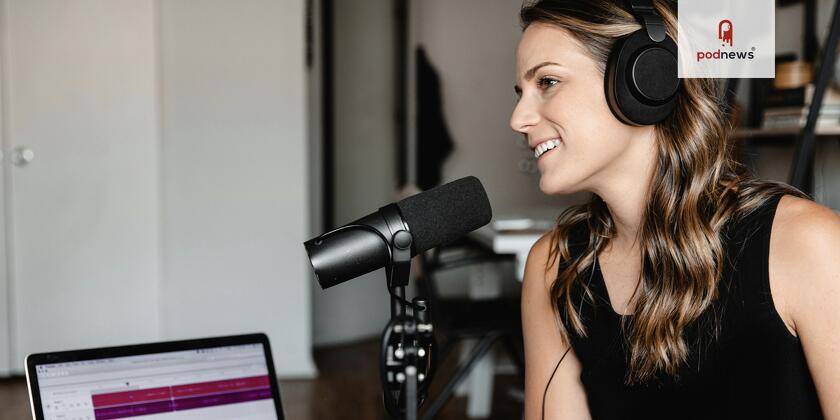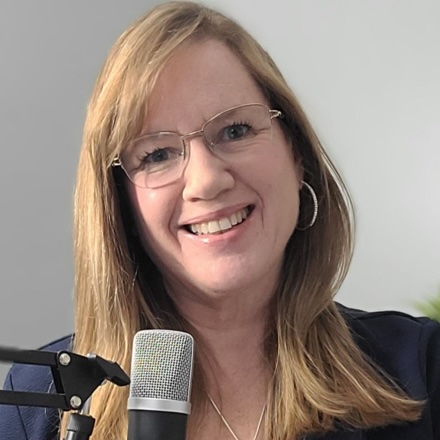
Stop Guesting and Hoping: How To Turn Interviews Into Real Results

Podcast guesting should be a business growth strategy. You show up, share your expertise, and watch the leads roll in… right?
I see this every day with smart, experienced experts. They’re guesting on podcasts to boost visibility, authority and leads on a regular basis, giving tons of value, and showing up with the best intentions—but they’re not getting the results they were hoping.
The problem? Visibility doesn’t equal conversions.
And you can’t necessarily blame the podcast or host. In fact, you have more control than you think!
You CAN lead the conversation with strategy, align your message AND guide listeners to your offer.
These three guesting mistakes could be the reason your inbox is quiet—let’s change that.
Mistake #1: Thinking “Having a Topic” Is Enough
Most podcast guests start with a few decent topics. They sound relevant. They might get them booked. But getting booked isn’t the same as getting results.
If your topic is vague, generic, or disconnected from your offer, you’re missing a major opportunity.
A strong topic does more than get you on the mic. It positions you as the expert, signals the problem you solve, and sparks curiosity around your offer. It’s the first step in guiding your audience toward wanting more from you—not just listening and moving on.
SHIFT: Your topic is more than a headline. It’s your hook, positioner and billboard!

A ‘Billboard-Ready Topic’ does 3 things:
-
Entices the host – So that they understand the value you bring, can picture the interview, and feel confident you’ll serve their audience. That’s how you get booked—especially on premium shows.
-
Hooks the listener – Your topic is often used as the episode title. When a listener decides to listen or keep scrolling, it’s the title that grabs their attention, so they know it’s relevant for them and will bring them value.
-
Signals your authority – It makes you sound like a pro, not a placeholder. It sets you apart and showcases your expertise.
It needs to stop the scroll, spark curiosity, and position you as the expert from the very beginning.
Mistake #2: Thinking “I just need to teach and share what I know.”
This one sounds helpful—generous, even. “Just give value,” they say. But teaching alone doesn’t create demand, and it doesn’t lead a conversation that converts.
You might think you already know how to talk about what you do, but if your messaging isn’t crystal clear, strategic, and compelling, you’re leaving opportunities on the table.
Rambling, using generic language, or failing to differentiate yourself makes it easy for listeners to forget you—and even harder to understand why they need your offer.
On the flip side, some guests firehose too much information, leaving the audience full or overwhelmed. They walk away with notes, not next steps.
Without structured, high-impact talking points, you blend in instead of standing out—and miss your chance to turn curiosity into conversions.
SHIFT: Your talking points should lead the listener to your offer
Think of the conversation as a ‘Bridge to Profits’ that connects the audience (and their problem or pain) and leads them down this path, to where they see YOU as the solution.
First, you want to talk about the problem, what the audience struggles with (some guests skim over that and jump to sharing tips). The audience wants to self identify, think ‘yes that’s me’, so they naturally want to listen to more of what you have to say.
You can lead listeners toward your bigger solution by telling stories, showcasing results, mentioning your programs, your formula’s, processes or frameworks. These set you apart and differentiate you over competitors.
Give them enough to spark curiosity, understand what you do and how you can serve them—but not so much they think they can DIY their way out of the problem.
Mistake #3: Going With The Flow For An ‘Organic Conversation’
But “I don’t want to sound scripted” - I get it. No one wants to sound robotic. You want flow, connection, authenticity.
But here’s the danger: When you aim for “organic” without any structure, you’re leaving your message—and your results—up to chance. Especially when the host goes rogue and the conversation starts bouncing all over the place.
Most hosts rely heavily on your one sheet to guide the interview. But if your one sheet is just a generic mix of 3 broad topics and 7–10 questions, the conversation often becomes a grab bag. They’ll pull from different sections, jump between ideas, and the result? A scattered interview that doesn’t fully showcase your expertise or lead listeners anywhere meaningful.
SHIFT: Organic doesn’t mean unprepared. Create an Interview GPS.
Structure is your secret weapon. You need a ‘compass’ to create a strategic conversation—so you can guide it naturally while still hitting the messaging that matters.
It means you’re clear enough to be conversational—and strategic enough to stay focused.
Your Interview GPS is the interview questions that you give the host. That’s how you guide the interview without sounding salesy or pushy.
Hosts will thank you. Listeners will follow you. And you will finally feel in control.
These three shifts aren’t about being rigid, scripted or sounding rehearsed. They’re about being intentional and strategic.
When you know what role your interview plays in your business (and how to show up accordingly), you stop creating content that gets applause—and start creating conversations that get clients.
If you want to stop leaving success to chance and start leading every interview with strategy - and turn your message into results, check out all 5 shifts in this free resource.
From Crickets to Clients: 5 Shifts to Turn Podcast Interviews Into Real Results
Shift from hopeful exposure to purpose-driven results and grab your copy here: www.LeverageYourPodcast.com/clients


































































































